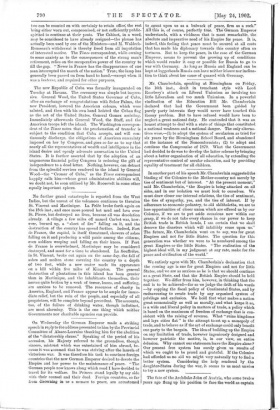On Wednesday the German Emperor made a striking speech in
reply to the address presented to him by the Provincial Committee of Alsace-Lorraine thanking him for the abolition of the "dictatorship clause." Speaking of the period of his accession, his Majesty referred to the groundless, though sincere, mistrust which was entertained of him abroad, be- cause it was assumed that he was striving after the laurels of victorious war. It was therefore his task to convince foreign countries that the new German Emperor desired to devote the Empire and her power to the maintenance of peace. "The German people now knows along which road I have decided to travel for its welfare. Its Princes stand loyally by my aide with their counsel and their deed. Foreign countries, so far from discerning in us a menace to peace, are accustomed
to_count upon us as a bulwark of peace, firm as a rock." All this is, of course, perfectly tine. The German Emperor understands, with a vividness that is most remarkable, the absolute and imperative need of his Empire for peace. It is, indeed, this feeling that peace must be secured at all costs that has made his diplomacy towards this country often so tortuous. But to keep the peace, in the case of the German Emperor, means to prevent the growing up of conditions which would render it easy or possible for Russia to go to war with Germany. As long as Russia and England can be kept at loggerheads Russia can have neither leisure nor inclina- tion to think about her cause of quarrel with Germany.






































 Previous page
Previous page